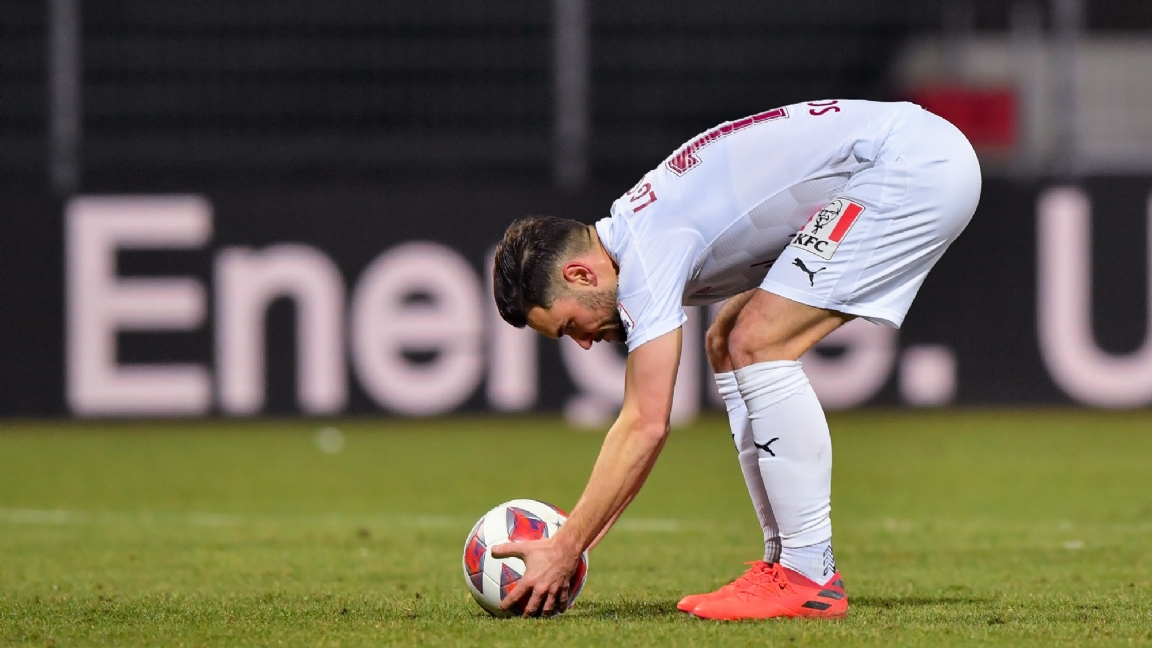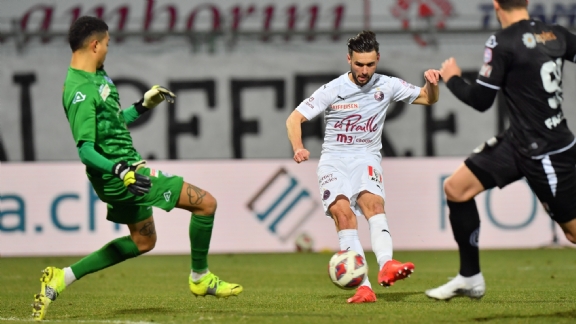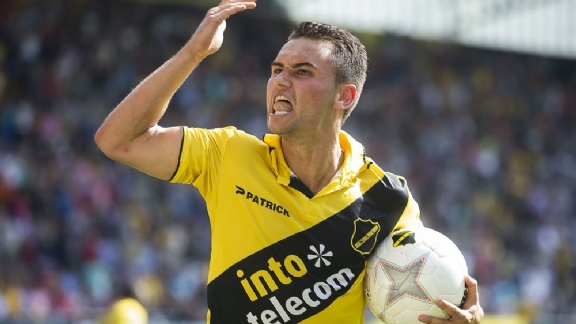![]()

When Alex Schalk arrived in Geneva three years ago, Servette FC was still a sleeping giant on the second level. The seventeen-time champion of Switzerland is slowly but surely awakening, partly thanks to the 28-year-old attacker, after having been in an unprecedented valley twice. Schalk will play European football for the second time next season with Servette and the moment is approaching in his career to perhaps take another step up.
By Chris Meijer
During the conversation, Schalk’s voice cuts out for a moment. When the connection is restored, he apologizes with a smile. “It was just me, I think. Of course I’m here in the mountains now, aren’t I”, it sounds immediately. Servette is preparing for the new season in the Swiss Alps, which will officially start on July 22 – eleven days after the European Championship final. In the second qualifying round of the Conference League, Molde FK is the opponent for the number three of the past Super League season. “That’s one of the hardest clubs we could face in this round, as they were only eliminated in the Europa League eighth final last year. That will be tough, but a great experience anyway.”
“The advantage is that we take over Molde’s seeded status if we win. I was hoping for Feyenoord a bit, although that chance was very small. That won’t be the case in the next round either, so let’s go in the group stage”, Schalk continues with a smile. Servette was not exactly lucky with the draw last season either. Schalk’s employer then entered the first qualifying round of the Europa League and won against the Slovakian Ruzomberok, but then encountered Stade Reims. The French club was 0-1 too strong for Servette in Geneva. “We were a bit unlucky, indeed.” Schalk shrugs. Servette is in any case back on the podium where the club belongs and that kind of opponents are part of that.
The seventeen-time champion of Switzerland, the most successful club in the Alpine country after Grashopper and FC Basel, has had a number of jet-black years. Servette went bankrupt in 2005, so a restart had to be made at the third level of Swiss football. Within six years we knew lesson Grenats to return to the Super League, but that was not the end of the financial problems. In 2012, a bankruptcy could hardly be avoided with money from the rugby and hockey departments, but from a sporting point of view Servette had to stop. Less than four years after returning to the highest level, Servette was completely back to square one, at the third level. After a sporting event, a forced relegation followed, because the Swiss Football Association did not grant Servette a license for the second level.

‘That trainer grabbed me after two weeks and said, ‘Take it easy, boy”
Voetbalzone spoke to Alex Schalk earlier in February 2019, when he was working on his first season with Servette FC. He then spoke at length about his Ross County adventure.
Under the leadership of chairman Didier Fischer, Servette has been working on leaving these dark times behind for good since 2015. Schalk arrived in Geneva as Servette entered his third year in the Challenge League – the second tier of Swiss football – in the 2018-19 season. “When I chose Servette, people thought it was a bit strange. I had a good season in Scotland and therefore quite a few options, also in the Netherlands. Servette’s plan was just right, financially I can’t complain either. The goals turned out to be correct afterwards, I also believed in them,” says Schalk, who played for the Scottish Ross County, Go Ahead Eagles, PSV and NAC Breda before coming to Servette. The 28-year-old attacker told two years ago football zone Already talking about Servette’s plans: become champion in the Challenge League and then slowly but surely conquer a place in the top of the Super League.
For the time being, it has worked out as it was outlined for Schalk three years ago: in his first season the championship in the Challenge League was conquered by force majeure, after the promotion, European football was immediately achieved with fourth place in the Super League and in the past season Servette finished third and reached the semi-finals of the cup tournament. “You can tell from everything that this has always been a big club. They have done a lot at the administrative level in recent years. Everything is back on track, it is quiet at the administrative level. Good people have been recruited and put in the right positions. Technical director Philippe Senderos, for example, who has played at major clubs in the past (including Arsenal, AC Milan and Valencia, ed.). With big names in important positions, the club becomes more famous in terms of name.”
Alex Schalk at Servette
| STATISTICS | 2018/19 | 2019/20 | 2020/21 |
|---|---|---|---|
| Matches | 28 | 23 | 35 |
| playing minutes | 2001 | 1174 | 1987 |
| Goals | 9 | 7 | 10 |
| assists | 5 | 7 | 3 |
“The club continues to build and grow, so that is also important,” continues Schalk. “It has traditionally been a club that belongs to the elite of Switzerland, with the seventeen league titles. Eventually they want to return to the absolute top, but with Young Boys there is now a gap of 20 to 25 points in the ranking. If you’re realistic, you’re not going to close that gap in one or two years. It’s possible, if you suddenly have a perfect season like Leicester City. But normally it still takes a few years, but all the better that I can be part of that project. I have adapted well and am now an important pawn for the team, hopefully I can continue that.”
Schalk emphasizes that Young Boys and FC Basel are still a size too big for Servette for the time being. Young Boys became champions with a lead of 31 points over FC Basel and 34 points over Servette. “We were close to second, but in the end Basel was still a size too big. I think this mainly has to do with the width of the selection. Young Boys was just way too strong for everyone. If we behind those two clubs best of the rest and make the hole smaller and smaller, we are getting closer and closer. Last season we took seven out of twelve points against Young Boys, those are the numbers you want to see against such a big opponent. Only we have left it against the smaller clubs, we have to become more consistent to close the gap. That is also a challenge in itself.”

The fact that Servette is slowly but surely returning to the top of Swiss football is certainly a source of enthusiasm in Geneva. “Geneva is not really a football city, but you do notice a difference in how people react when you sit in a restaurant or on a terrace and walk through the city. People approach you again, they ask how you are doing and they know who you are. That wasn’t real in the Challenge League yet, so it’s nice to experience that,” says Schalk. In the balanced selection of Servette – which, in addition to the necessary experience with Kastriot Imeri, Alexis Antunes and Nicolas Vouilloz, houses three youth internationals from Switzerland – Schalk is, in his own words, a ‘man who takes the team in tow’. A year ago, he signed a new contract with Servette, which runs until mid-2022, despite the cautious interest of FC Sochaux, Roda JC Kerkrade and his great love NAC Breda, among others.
“In the end, there are always some things to consider. We have done well as a club, so there is always an individual interest. Well, then you have to start all over again. That’s not a bad thing, but then it should be for a step up. Both sportingly and financially. Who knows, maybe that will come”, Schalk nods. He agrees that Servette still has a ‘great prospect’. “So I would only like to trade it in for a bigger club than Servette. But then, the puzzle has to fit together exactly. That is often the most difficult thing in football, let alone in times of corona and with an ongoing contract.”

In the early years of his career, Schalk celebrates a goal in the shirt of NAC, the club where he was trained, made his debut in professional football and was nicknamed ‘the Bomber of Breda’.
Schalk is on a contract with Servette for another year. Coincidentally, he was told earlier in the day from technical director Senderos that the club intends to find an agreement on a new contract before the start of the season. “That’s always good news. I didn’t really expect anything else, because I am now a boy with experience and otherwise I will walk out the door for free. But if I continue my form from last season for another two or three months and can be picked up on a free transfer from January, it will be all the easier for bigger clubs. The game is on the wagon, as they call it. I have to think about it for a while and then I’ll discuss it properly.”
“If there is ever an opportunity to go to a bigger club, it will be this year or next year,” Schalk added immediately. “After that I’ll be thirty and that doesn’t mean I’m old, but you know how it works in football. That is also possible, but the puzzle just has to fall into place. I don’t know exactly how I envision that, I’ll have to think about it some more. For myself and my family at some point I have to start looking at the options, maybe to play football closer to home. Of course I would like to play in the Eredivisie again. When I played in the Eredivisie, I was nineteen or twenty. Young, not quite yet ready. I now have that idea, the backpack is quite full and I have shown it at the highest level in recent years. I don’t know why that wouldn’t work in the Netherlands. But then you have to find a club where you fit into the system and who see it in you.”
For the time being, Schalk now has at least another year ahead of Servette. That season is off to a fast start. Three days after the first match of the diptych with Molde in Norway, the first league match against FC Sion is already waiting. During the training camp in the Swiss Alps, there is therefore not according to the French battle tranquill, trained. Much to the delight of one player. With a smile: “It’s tough and tough weeks, but that’s nice. Anyway, it’s nice to be playing with the ball again.”
